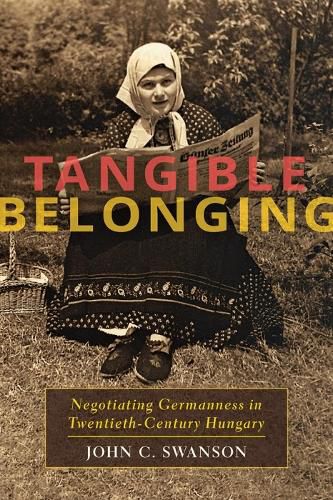Readings Newsletter
Become a Readings Member to make your shopping experience even easier.
Sign in or sign up for free!
You’re not far away from qualifying for FREE standard shipping within Australia
You’ve qualified for FREE standard shipping within Australia
The cart is loading…






Tangible Belonging presents a compelling historical and ethnographic study of the German speakers in Hungary, from the late nineteenth to the late twentieth century. Through this tumultuous period in European history, the Hungarian-German leadership tried to organize German-speaking villagers, Hungary tried to integrate (and later expel) them, and Germany courted them. The German speakers themselves, however, kept negotiating and renegotiating their own idiosyncratic sense of what it meant to be German. John C. Swanson’s work looks deeply into the enduring sense of tangible belonging that characterized Germanness from the perspective of rural dwellers, as well as the broader phenomenon of minority making in twentieth-century Europe.
The chapters reveal the experiences of Hungarian Germans through the First World War and the subsequent dissolution of Austria-Hungary; the treatment of the German minority in the newly independent Hungarian Kingdom; the rise of the racial Volksdeutsche movement and Nazi influence before and during the Second World War; the immediate aftermath of the war and the expulsions; the suppression of German identity in Hungary during the Cold War; and the fall of Communism and reinstatement of minority rights in 1993.
Throughout, Swanson offers colorful oral histories from residents of the rural Swabian villages to supplement his extensive archival research. As he shows, the definition of being a German in Hungary varies over time and according to individual interpretation, and does not delineate a single national identity. What it meant to be German was continually in flux. In Swanson’s broader perspective, defining German identity is ultimately a complex act of cognition reinforced by the tangible environment of objects, activities, and beings. As such, it endures in individual and collective mentalities despite the vicissitudes of time, history, language, and politics.
$9.00 standard shipping within Australia
FREE standard shipping within Australia for orders over $100.00
Express & International shipping calculated at checkout
Tangible Belonging presents a compelling historical and ethnographic study of the German speakers in Hungary, from the late nineteenth to the late twentieth century. Through this tumultuous period in European history, the Hungarian-German leadership tried to organize German-speaking villagers, Hungary tried to integrate (and later expel) them, and Germany courted them. The German speakers themselves, however, kept negotiating and renegotiating their own idiosyncratic sense of what it meant to be German. John C. Swanson’s work looks deeply into the enduring sense of tangible belonging that characterized Germanness from the perspective of rural dwellers, as well as the broader phenomenon of minority making in twentieth-century Europe.
The chapters reveal the experiences of Hungarian Germans through the First World War and the subsequent dissolution of Austria-Hungary; the treatment of the German minority in the newly independent Hungarian Kingdom; the rise of the racial Volksdeutsche movement and Nazi influence before and during the Second World War; the immediate aftermath of the war and the expulsions; the suppression of German identity in Hungary during the Cold War; and the fall of Communism and reinstatement of minority rights in 1993.
Throughout, Swanson offers colorful oral histories from residents of the rural Swabian villages to supplement his extensive archival research. As he shows, the definition of being a German in Hungary varies over time and according to individual interpretation, and does not delineate a single national identity. What it meant to be German was continually in flux. In Swanson’s broader perspective, defining German identity is ultimately a complex act of cognition reinforced by the tangible environment of objects, activities, and beings. As such, it endures in individual and collective mentalities despite the vicissitudes of time, history, language, and politics.